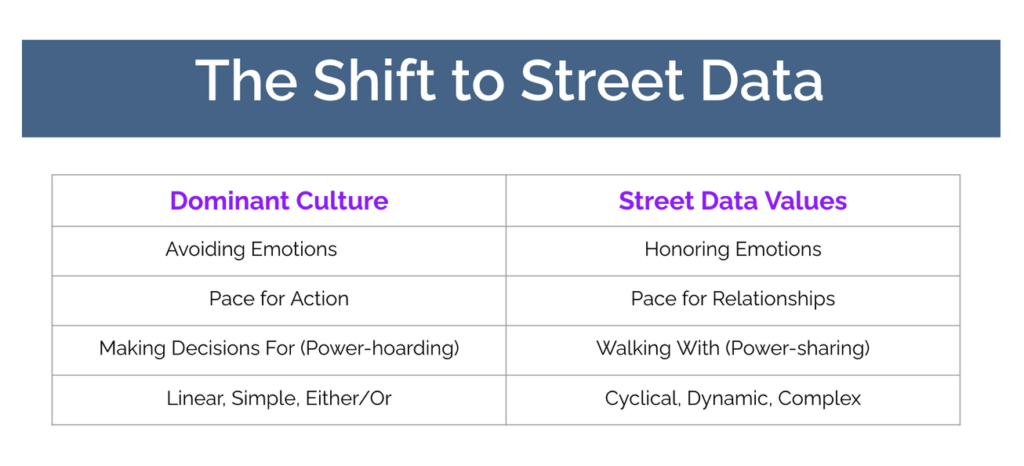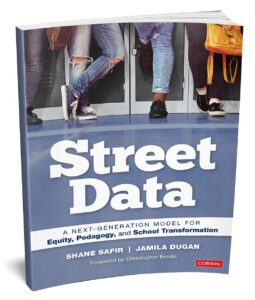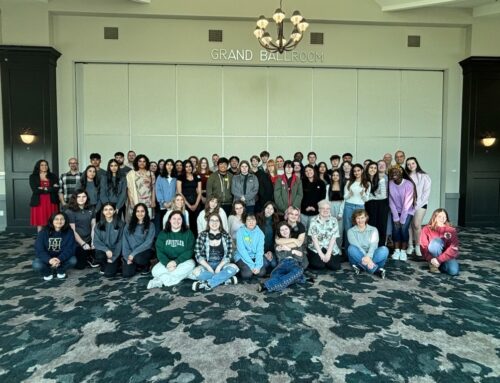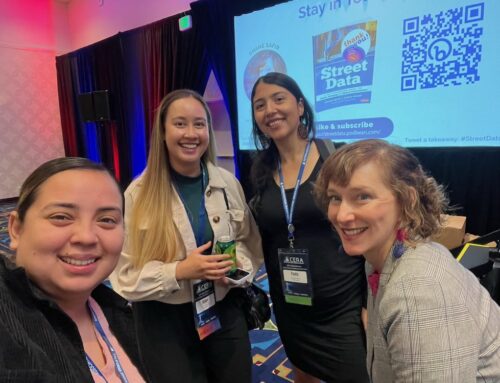Hey, community!
A few weeks ago, Jamila, our colleague Jessica Wei Huang, and I facilitated a sold-out Street Data Fundamentals workshop. This was our first time running a PD where a majority of educators work in international schools—about 2/3rds—alongside folks from the U.S. and Canada. Schools in the Zoom Room included:
- Daegu International School
- Dulwich College Suzhou
- Saigon South International School
- Taipei American School
- The American School in Japan
- The International School of Kuala Lumpur
- The United World College of South East Asia
It was so cool to test drive Street Data tools with folks from a diverse range of contexts! We witnessed high engagement, a hunger for the content, and an undercurrent of pain from educators of color in international schools who often feel marginalized and alienated despite DEIJ (Diversity Equity Inclusion and Justice) being the initiative du jour.
The unique mix of learners called on us to make deeper connections to how colonialism manifests in international school settings. This experience brought me back to 2010-11, the year I taught at an international school outside of Amman, Jordan (when my now 12 and 16-year olds were 1 and 4!). There was no “DEIJ” language on campus, and the cross-cultural dynamics of a predominantly local, Jordanian staff alongside a handful of expats like us were really complex. As an English teacher and colleague to veteran local staff, I experienced a steep learning curve when it came to navigating local cultural norms. Looking back, I still reflect on how the Street Data tools—empathy interviews, story-telling, cultivating self-awareness—would have helped me become a better colleague.
In today’s blog, Jessica Huang and I will share some emergent lessons on dominant culture in schooling, stemming from this recent experience.
 Jessica Huang (https://www.jessicaweihuang.com/) is an educator & school leader with 20+ years of experience as a classroom teacher, school administrator and leadership coach/facilitator. She has a wide range of knowledge for how to build equitable school communities through her on-the-ground work in schools and her support and coaching of educator leaders and teams. Jessica believes in building healing-centered, student-focused spaces where students of all backgrounds can thrive. Jessica has a Bachelor’s of Foreign Service from Georgetown University and a Master’s of Education from Stanford University. Her experience in both the public school system in the US and in international schools equips her to lead in a wide-variety of cultural-contexts. Jessica is currently serving as Vice Principal of Wellness and Wellbeing at United World College of South East Asia in Singapore where she lives with her two children and beloved Taiwanese mountain dog.
Jessica Huang (https://www.jessicaweihuang.com/) is an educator & school leader with 20+ years of experience as a classroom teacher, school administrator and leadership coach/facilitator. She has a wide range of knowledge for how to build equitable school communities through her on-the-ground work in schools and her support and coaching of educator leaders and teams. Jessica believes in building healing-centered, student-focused spaces where students of all backgrounds can thrive. Jessica has a Bachelor’s of Foreign Service from Georgetown University and a Master’s of Education from Stanford University. Her experience in both the public school system in the US and in international schools equips her to lead in a wide-variety of cultural-contexts. Jessica is currently serving as Vice Principal of Wellness and Wellbeing at United World College of South East Asia in Singapore where she lives with her two children and beloved Taiwanese mountain dog.
Jessica’s Reflections on Dominant Culture in Schooling
As an Asian-American woman and longtime educator, I have spent the last 3 years teaching and leading in international settings. This experience has shown me how deep colonialism runs in international schools, a concept I understood intellectually, and now have experienced personally. In her article, “Elite International Schools Have a Racism Problem”, Obiko Pearson, a biracial Japanese American woman who attended an international high school in Japan, describes her daily journey to campus as “a 45-minute exercise in learning to shut out the country [we] lived in and immerse ourselves in a land quite literally constructed to suit foreign sensibilities.” In many international schools, students of color are predominantly taught and led by white/Anglo faculty and school leaders. In Asian international school settings, the dominant culture often looks like a minority group of white educators controlling the norms for language, values, behavior, and communication.
Hiring practices are one important example of how dominant cultural norms harm students and teachers of color in international schools. By adhering to an ideology of white supremacy and colorism, many schools continue to hire predominantly white teachers. Over time, they begin to operationalize underlying biases into systemic practices, which might sound like: “This is the way we have always done it” or “These are the personality types and skills that we are looking for”. The resulting lack of diversity has a cultural impact that ripples out in countless ways: from Eurocentric curriculum, to microaggressions in hallways and classrooms, to Westernized norms for meetings and schedules.
Reflection: What’s the dominant culture of schooling in your context? What are the implicit or explicit norms and ways of being? Who benefits and who is marginalized?
Dominant Culture Pitfalls
We want to illuminate four dominant cultural pitfalls that Street Data can help us shift away from.

The Shift from Avoiding Emotions to Honoring Emotions (Jessica’s reflections)
Dominant culture, or Western ways of knowing, teaches us from a very young age that emotions have no space in our professional lives. From getting in trouble for crying at school, to transactional business meetings in the workplace, we learn from experience that showing emotion is “weak” and “unprofessional”. Street Data, by contrast, invites us to honor and understand emotions as central to adult and student learning. Shifting to a culture that honors emotion can feel uncomfortable and jarring. For people of color, being able to bring our full selves to a professional setting means that our colleagues need to care about, accept, and welcome our emotions—our love, rage, sadness, and hurt. Last year, I led a Kiva Panel listening session with students about their experience of gender inequality in the school. Afterwards, one student reflected, “That experience was like a great counseling session. I already feel better”. The human need to connect—to feel understood and cared for—is at the heart of the Street Data process.
The Shift from Paced for Action to Paced for Relationships (Jessica’s reflections)
Working toward equity in a school community requires deep relationships. Without an understanding of the human experiences in our school communities, particularly the experiences of those at the margins, we may fall into the dangerous traps of paternalism and hoarding power. Leaders who are used to making unilateral decisions and “taking action” default to dominant cultural ways of being at the expense of listening to the lived experiences of their students and faculty. Conflict ensues as leaders announce action plans and projects, seeking volunteers to help out, but a lack of relational trust and clear vision causes even the best plans to fall flat. Pacing for relationships means that before any technical work gets done, we choose to focus on building relationships and community. We work towards answering the questions, “Who am I? Who are we?” before moving together towards a collective goal.
The Shift from Making Decisions For to Walking With (Shane’s reflections)
To expand our ways of being and disrupt the oppressive tendencies of dominant culture, we must learn to walk with students, families, and colleagues rather than make decisions for. Sharing power and walking with is harder and slower than hoarding power and doing for. It requires us to be vulnerable, slow down, and resist the urge to control. It requires us to take the time it takes to develop a collaborative vision of change. One point of impact for this shift is the composition of your local equity or DEIJ committee. If your school has such a body, ask yourself, what is the demographic make-up of the group and, just as important, of its leadership? If we create an equity/DEIJ committee with predominantly white people and others who represent the dominant culture, the absence of a lived experience of racism will undermine our racial equity lens from the start. To walk with others, we have to expand the decision-making table and invite students, families, and staff from marginalized backgrounds to not just give input, but to shape direction. When we “choose the margins” and truly share power, we begin to create a humanizing culture that counters the chilling effects of white supremacy.
The Shift from Linear, Simple, Either/Or to Cyclical, Dynamic, Complex (Shane’s reflections)
Dominant culture tends to rely on linearity as a governing principle. We assume a simple relationship between cause and effect: “If I take this action, this thing will change.” When confronting systemic inequities in schooling, we face complex issues that shift and emerge in new forms every year (or even month to month). We need to address these issues through a complex adaptive change model for which Street Data is an ideal match. By keeping our finger on the pulse of day to day emergent patterns through deep listening and observation, we begin to understand the nature of the pain being experienced at the margins, as well as the possibility of real change. To gain such insight, we have to stop seeking a quick “solution” for complex problems of inequity: a single action to take, a magic curriculum, a detailed strategic plan. We have to learn to tolerate and even embrace uncertainty, navigating it with the tools that the Street Data framework offers us (listen, uncover, reimagine, move… in never-ending cycles of inquiry). Through this process, we find our power and our freedom from the constraints of dominant culture.
Closing
Street Data is a hopeful model that honors the lived experiences of those we do this work for. At its best, it inspires radical dreaming. Schools are a stronghold of the past, constructed for the benefit of a world economy moving from industrialization to globalization. International schools in particular have deep roots in colonization. As the author Haruki Murakami writes, “What we call the present is given shape by the accumulation of the past”. Only by seeing a clear picture of the influence of history on our present reality, can we radically dream of a future where schools are be a driving force for community, compassion, identity development, and student agency.
Reflection questions to shape your entry to Street Data work:
- Who is at the margins of your school or system?
- How will you center their voices and experiences?
- How will you share power?
A version of this piece was also published by Jessica Huang on medium.com.
Featured Learner Work!
 Joel Jr Llaban is an international school leader who attended the Street Data workshop. Here are his words on the experience:
Joel Jr Llaban is an international school leader who attended the Street Data workshop. Here are his words on the experience:
The beliefs, mindsets, and framework of Street Data is for anyone who believes in educational justice, in a truly humanizing and restorative education for children; and for those who envision a radical transformation on how we design a kind of education that centers children: their power, potential, possibilities; drawing from their abundance and joy, and harnessing their individual and collective agency. The workshop led by Shane, Jamila, Jessica, and Alykhan inspired, challenged and compelled us to dismantle and “see the barriers”, barriers and systems we have internalised and inherited in education that have long harmed and dehumanized children. It will further enable us to deeply reflect on the “stories of harm and hope as tools for learning and transformation”.
Joel wrote a beautiful poem that he read aloud in our workshop and gave us permission to include. Enjoy the invitation to radical dreaming!
We Are Who We Are | A Radical Dreaming
Joel Jr Llaban
Dreaming of a place and space
where it centers me and you.
Our past, our present, our future.
It centers our stories,
our ancestors’ stories,
And the stories of our children’s children.
Here, within. It centers the lives we live,
and the loves we have and hold.
We are brave and bold.
Where I see me and you,
It centers on our dreams and desires.
It centers our homes and happiness,
Our solidarities, our solitudes, and our joys.
It centers our leadership, our inventions,
ideations, and innovations.
Not commodified. Not consumed.
Not reviled. Not vilified.
It centers our communities,
and all its intersections,
And what we bring and what we build:
Our people, our passion, our pathways,
our pulse and our power.
In a place where we will be who we are:
Unquestioned and Undenied,
Beautiful. Legal.
No explanations and justifications.
Not silent, not silenced.
Existing. Resisting. Breathing.
Where we whisper, speak, and sing
And dance, and move, and create
With the languages we have,
The languages of our hearts and minds,
Of our flesh and bones,
On the lands and in the languages we own.
In a place where we are not only accepted and tolerated,
but are fully and authentically living, loved, and lived.
Caring for and carving new paths,
Writing our songs, nourishing our souls,
making our own art,
Dismantling the shackles of our histories and hearts.
Our skins and spirits once exhausted and castigated
from the racism, sexism, classism, and casteism of the past,
We are free from the oppressions and oppressors from within,
And the oppression and the oppressors pressed upon
That have long caused harm, hate, and doubt,
To restore and reclaim who we are,
and the joy and genius of what we are truly about!
In a place where we live our dreams,
With our lives and love,
In our homes, we call our own.
In places where we belong,
Where the wholeness of our humanity
Enshrined. Protected.
Safe. Sanctified. Sacred.
As we rest and play,
and build new tools, new todays,
and new tomorrows,
No concessions and distortions,
We grow up and out
of our internalized and ingrained sorrows.
We are healed of our wounds,
From the terrors and horrors,
Of that gaze and hateful rage.
We are fortresses of courage.
No spear, No fear.
No chains, No pain.
No borders, No orders.
No quiet and blasting war.
We will live and love our truth
We are who we are.
Upcoming Virtual Offerings
Street Data Fundamentals: A Path to Equity and Antiracism
Thursday, May 19, 2022 1:00 – 4:00 PM Pacific Daylight Time (4:00 – 7:00 PM EDT)
More Info/Register Now >
NEW!!! Street Data in Action: Building an Antiracist Graduate Profile
Thursday, May 26, 2022 3:30 – 6:30 PM Pacific Daylight Time (6:30 – 9:30 PM EDT)
More Info/Register Now >
Last, but not least…
We wanted to share this recent article that highlights the work that Dr. Jamila Dugan, Joe Truss, and I have been doing over the last couple of years. So beautiful to see Street Data coming to life in authentic ways in these school districts!
Three tools to help educators better understand what students need – KQED’s MindShift

 Enter your email here and get a free copy of the first chapter of Street Data!
Enter your email here and get a free copy of the first chapter of Street Data!




Leave A Comment
You must be logged in to post a comment.